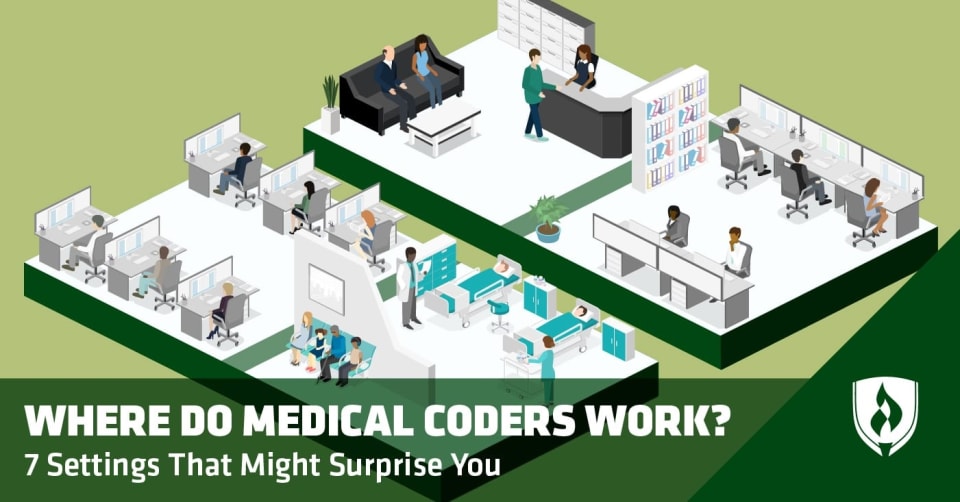
The healthcare industry is constantly growing and changing, and one of the lesser-known careers taking part in that growth is medical coding. This career didn’t even exist a few decades ago but is now a crucial mainstay of the healthcare industry—and the surge of opportunity is ongoing.
Medical coding jobs are projected to increase at a faster-than-average rate of 8 percent through 2028, according to the Bureau of Labor Statistics (BLS).1 That’s great to know, but you likely have more questions—like, “Where do medical coders work?” “And what exactly do they do?”—to get sorted out.
We turned to data and expert insight to answer those very questions. Keep reading to learn more!
But first, what does a medical coder do?
Medical coders will hang their hats in different work environments depending on what they do. At the most straightforward level, medical coders are essentially translators of medical information. They review patient information and assign appropriate diagnosis and procedure codes for patient care, population health statistical tracking and billing purposes. As you might imagine, our healthcare system generates a massive amount of information—and these codes provide a system for keeping it all organized.
These professionals play a central role in what is actually a fairly wide-ranging career path: health information management. While not everyone working in a career focused on the health information ecosystem will spend their time strictly doing this “translation” work, medical coding is directly tied to what they do. Whether that’s auditing billing information for coding mistakes, coordinating payment between government agencies and insurance providers, or preparing medical records for release, medical coding shares significant overlap.
Where do medical coders and other related health information professionals work?
While hospitals and clinics might be your first assumption, medical coders and other health information professionals can be found working in a wider variety of settings than you may think. Let’s explore some of the options.
1. Hospitals & doctors’ offices
There’s no surprise here—hospitals need medical coders to document and assign codes for each medical procedure a patient receives. They research codes, interpret patient charts and use specialized medical coding software to assign the proper codes. Doctors’ offices and specialty clinics, such as dermatology or dental offices, also use medical coders to process billing and insurance claims.
Hospital patients may receive a number of treatments from several different physicians. That means hospital medical coders should be prepared for plenty of critical thinking and research to track down obscure medical codes. This can be a fun challenge, but don’t rule out working in a smaller, more narrowly specialized clinic, which also offers advantages.
2. Healthcare consulting services
Many companies act as consultants that can help hospitals, healthcare networks and clinics problem-solve and plan for the future. These companies hire a wide range of healthcare employees to help design, develop and implement solutions for performance and profitability in hospitals, health systems, physician practice groups and more.
A health coder in this kind of work environment would likely view clinical documentation and diagnostic results to extract data and apply appropriate ICD-10 diagnosis and procedure codes for billing, reporting, research and regulatory compliance.
Some of these companies specialize in IT, creating products to streamline medical coding and billing processes. Medical coders play a vital role in these companies, conducting audits and reviews to ensure accurate coding and prevent claims from being rejected due to coding errors.
This type of work environment might be a good pick for health information professionals who are interested in improving and modifying systems, as well as troubleshooting existing communications.
3. Educational institutions
Colleges and technical schools need experienced medical coders to train the next generation of coding students. While there are no official educational requirements for medical coders, the Bureau of Labor Statistics (BLS) states there are certifications that can be earned from an accredited institution.1 These schools offer plenty of opportunities for trained medical coders to share their knowledge with students.
Teaching jobs typically require a few years of on-the-job experience, so they make a great option for seasoned medical coders who are ready for a change of pace. This is the perfect career path for anyone who loves the ins and outs of medical coding and enjoys sharing their wisdom with others.
Additionally, educational institutions may need medical coders for university-owned hospitals or clinics—the work of these coders will largely align with what you’d see in other hospital or clinic settings.
4. Insurance agencies
Medical coders who work for insurance agencies see patient claims from the other side of the table. They verify the accuracy of incoming claims and note whether any information is missing or potentially incorrect. Then they compare the treatment a patient received to their insurance plan coverage, so payments can be processed.
Medical coders who work in the insurance industry will need to have a solid understanding of medical codes and be willing to do the research to fill in the gaps. An eye for detail is critical since catching errors is one of their main job duties. They should also be up for the challenge of interpreting the details of insurance plans.
5. Law firms
Billing fraud is a big problem for healthcare providers. Incorrect billing procedures can cause a provider to come under fire for fraud—even if it was unintentional. A provider has to prove that any billing and coding errors were simply mistakes, or they may face criminal charges.
Law firms often hire health information professionals with medical coding expertise to help investigate fraud claims. These coders will examine records to help determine whether coding discrepancies were intentional or the result of billing fraud. A thorough knowledge of the laws and regulations governing programs like Medicaid and Medicare is a necessity in this medical coding position.
6. Government agencies
State and federal government agencies, such as the National Center for Health Statistics or state Medicaid departments, are another set of employers of medical coders. Daily job duties for coders in these areas are similar to those of medical coders in other industries: assigning codes, abstracting information, and reviewing and auditing incoming claims codes. Government agencies offer the opportunity to work on projects that may affect healthcare across the nation. While most medical coding roles have a strong focus on the financial side of healthcare, these codes also provide the government with valuable data for population health studies and other potential large-scale improvements.
7. Work-from-home medical coding
All of the work context choices for medical coders come with their own nuances. But there’s another popular option: medical coding from home. That’s right—you could be a successful medical coder from any place that has reliable internet access.
Working remotely as a medical coder certainly isn’t an option with every employer out there—and is typically only available to coders with significant experience. But since the job is so easily performed digitally, some companies are making remote work an option. If you live in a hard-to-access location, lack transportation options or just simply prefer to skip the commute and set up a workstation in your living room, then this option is definitely worth exploring.
Is a medical coding career right for you?
So, where do medical coders work? All over the place!
Now that you’re aware of the wide array of opportunities for medical coders and other health information professionals, you might be wondering if you have what it takes to land one of these positions. Check out our article “Your 5-Step Guide to Become a Medical Coder” to get a simple step-by-step breakdown.
1Bureau of Labor Statistics, U.S. Department of Labor, Occupational Outlook Handbook, [information accessed October, 2020] www.bls.gov/ooh/. Salary data represents national, averaged earnings for the occupations listed and includes workers at all levels of education and experience. This data does not represent starting salaries and employment conditions in your area may vary.
EDITOR’S NOTE: This article was originally published in September 2015. It has since been updated to include information relevant to 2020.
Most coding positions are not considered "entry level"; a combination of education and work experience is typically required to attain a coding position. Similarly, coders, especially those who are new to the field, should not expect to find a position where they can work from home. Most coding positions require onsite work.




